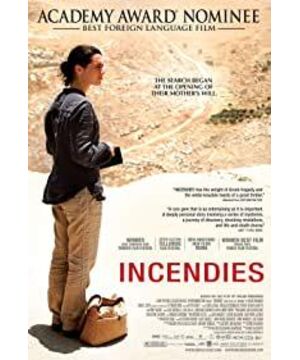blood society A society symbolized by blood, the transition to a knowledge society, a society of norms and a society of law. --Maurice Blanchot, "Voices from Others"
The film opens with the Boy Scouts enlisting in the army, and the second act chooses to use the notary publicity of the will as the official beginning. Children search for the historical relics of their parents and follow their wills to begin a journey to find their roots. So far, the plot is still mixed with the narrative of my father and mother, as written by domestic root-seeking writers. While the two lines are parallel, I think it can be divided into two parts: the upper part is narrated in parallel from the perspectives of mother Nava Marvin and Zhenma Wen;
1. Even if there is no war, where does the crisis of blood society come from?
Putting aside the storyline and going directly to the views I want to express, it may be a little detached. The war in the film is caused by religious differences. According to Blanchot's point of view, the blood-related society is becoming alienated. Even if there is no war to make trouble again, the blood-related society will still be disintegrated in the process of urbanization. What Utopia is Religious Wars trying to build? It is nothing more than wanting to achieve purity and exclude dissidents. People kill each other in order to maintain their beliefs. Isn't there already some sort of arrogant and prejudiced knowledge society? The war did not push the blood-related society to an end, but accelerated its evolution into a new organism that could no longer stick to its original face—society reorganized while staggering on the wreckage of the blood-related society.
The blood society slowly rebuilds itself in the film, going through its disintegration and Oedipus-esque tragic. It's hard not to be alarmed by the story as some sort of warning to modern society. "Clone Husband", "Don't Let Me Go" and other themes of overhead realism constructed with extremely rational social propositions are more like the lamentable variations that the blood society will collapse.
"Society of blood, which means the beautification of war, the supremacy of death, the praise of pain, and the greatness and nobility of sin." The
reason why the society of blood has come to an end is subject to the epochal nature of its own advantages, which belongs to the stage of historical rationality. , sooner or later will be overtaken and abandoned. At the same time, we have to admit that the danger of reason is not only a threat to the maintenance of blood-related society, but also that once rationality is politicized by blood-based social utopia, it will inevitably lead to racism.
In order to solidify this discussion in time, the rift in blood society comes from: first, not from reason, but some rationality or danger of rationalization (Foucault derives it from the perspective of power); second, war, as in the film, the confrontation between birth and death In the game, ritual collapses and music is broken, and good fortune makes people; the third is the social structure from the future, which means that, for example, the knowledge society will launch a surprise attack before the counterattack of the blood society.
2. What options do we have in place of religious belief
"Blood has eliminated sex." - The next question comes from Foucault, who sharply points out a certain crisis while still retaining his astute irony.
"Sex is the only good, and the good rejects any law or norm, unless (and this is important) satisfaction can be obtained by transgressing the law or norm, so that pleasure can be revived." - and Blanchot goes on to say.
The film is full of coincidences. For the first time, Nihad was not shot and killed by the Christian faction in Dahesh. Nihad used his sharpshooter to snipe many Christian soldiers before May; After Navamarvin was shot, he was not executed immediately, but was thrown into the Kafaliat Women's Prison; for the third time, the two met and the former imposed punishment in the form of rape.
Witnessing the tyrannical burning and killing of the passengers of the bus by the Christian party brought an astonishing turn to Navamarvin's rational concept - she began to throw herself into revenge against the Christian faction, and counted her undiscovered son among the Christian faction. superior. The opening of the film shows the slow motion of the Boy Scouts enlisting to shave their heads, echoing the fact that Nihad May was also in the Muslim faction headed by Zandinsey. In fact, the two originally belonged to the same camp and did not know each other. When Navamarvin was arrested and imprisoned, did Nihad May retain the remnants of goodness in his heart, which he imposed on the "singing woman" - Prisoner No. 72 who had been imprisoned for 15 years. can not rule out.
Nava Marvin has many growth nodes in the film, but they are ironic to each other and gradually sublimate.
For the first time, he chose to elope with the son of a refugee, causing Wabaha to be shot and killed by his brother.
The second time, after giving birth, he went to the city to study, and worked in the newspaper industry with his uncle.
The third time, on the way to find a child, I witnessed the Christian faction massacre Muslims.
The fourth time, she was pregnant in prison and had to accept the reality and give birth to a new life.
The civil war in Lebanon lasted for 17 years. There are many complex religious sects. Civilians are like grass on the wall, and life is like a mustard. When religion can't provide the last refuge, what belief can they choose - love - the only sublime that works and claims to put all religions under its control - opposed to the cruelty of war and the ignorant corruption of the system.
The call to love flies like a gossamer in a state of war in the movie.
3. In addition to love, what sublime possibilities exist in the theme of the
film. Through the film, in addition to praising maternal love, what else can we reflect on? Reflect on the devastation of war on people? Or the vulnerability of human beings in war? Or the dangers of ingrained beliefs about religious sects? Is it worth it when we hold on to our religious beliefs and risk losing our lives, losing our love, and a great indifference to our lives? The necessity of religious belief, no matter what era, how many wars, how many lives are sacrificed, is it unscathed? But isn't atheism sad?
4. Despair in the last days, one plus one equals one
"The first step in making a person unable to have himself is to make him deny some of his beliefs without reason, because then he cannot organize his beliefs and desires into a coherent coherent The net. He is irrational not because he is derailed from reality, but because he can no longer rationalize himself, can no longer justify himself." An Intellectual")
Abtaray has the tragic quality of Orwell's O'Brien. It's just that he doesn't understand the truth of "2 plus 2 equals 5", and the freedom of "2 plus 2 equals 4", which is even more ignorant and innocent-maybe that's why Navamarvin accepted and cooperated with her in the name of love. humiliation and interrogation.
Finally, when the twins handed the letter to Abtare, the sticker on the window read "1½", which could be interpreted in a number of ways: Since all three are Navamarvin's children, they should have a seat: 3. But the reason why 3 is not given directly should be due to their incompleteness. 1 is two ½, which is a metaphor for twins, and the extra isolated ½ should refer to Abu Tare. Navamarvin grants all the forgiveness she can give, equally, but divides the inheritance equally between the twins in order to preserve them, pushing Abtare into a vacuum.
Could it be that Navamarvin just has a certain desire like O'Brien: "Tear apart human hearts and reassemble them according to the new style of your choice." By the swimming pool, she recognized Abtalay again. , towards spiritual collapse. There is no way to recognize each other, and the despair of the end times is still in hot pursuit, until death. The loneliness of keeping a secret, when the story ends, spreads among the three father-son/brother-sister.
\END/
Past translation
"Harvest" by Amy Hempel
| Guide to Foucault · Advanced Reading and
Sorting | Guide to Foucault · All
Senses of the Book | Intensive Cultivation and Harvest of Power
| Storm in the Glass
View more about Incendies reviews










